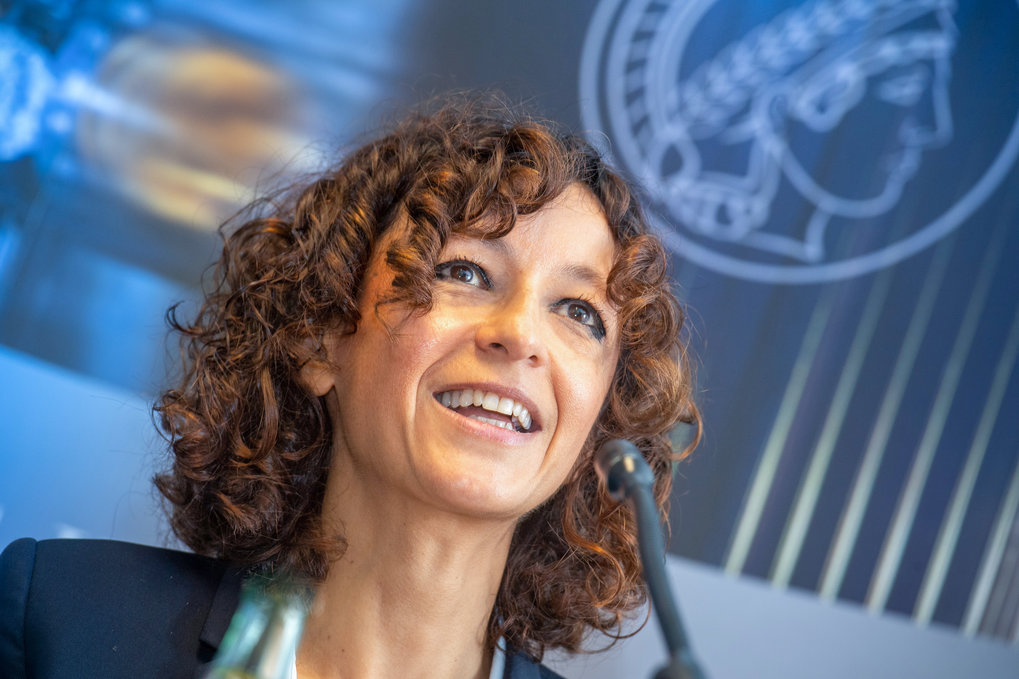The Royal Swedish Academy of Sciences has awarded this year’s Nobel Prize in Chemistry to Prof. Dr. Emmanuelle Charpentier, Scientific and Managing Director of the newly established Max Planck Unit for the Science of Pathogens in Berlin for her groundbreaking work on the CRISPR-Cas9 gene editing technology. She shares the prize with Jennifer Doudna from the University of California, Berkeley, USA.

“I am overwhelmed and deeply honoured to receive a prize of such high distinction and look forward to video-celebrating this exceptional award with my team members, colleagues, family and friends,” commented Emmanuelle Charpentier. “My special thoughts go to my former lab members – especially Elitza Deltcheva and Krzysztof Chylinski – who have contributed significantly to the deciphering of the CRISPR-Cas9 mechanism in bacteria and my colleagues of the field of CRISPR biology. This award obviously underlines the importance and relevance of fundamental research in the field of microbiology.”
Considered a revolution in the fields of medicine, biotechnology and agriculture, the CRISPR-Cas9 technology is a powerful and versatile tool to specifically and efficiently modify any genetic sequence in the cells of living organisms. Back in the 2000’s, CRISPR-Cas was originally described as an adaptive immune system in bacteria and archaea to fight off viral attacks. In 2011, Emmanuelle Charpentier at the Max F. Perutz Laboratories (now Max Perutz Labs) at the University of Vienna and at the Laboratory for Molecular Infection Medicine Sweden (MIMS) at Umeå University and her laboratory published a seminal article in Nature describing the identification of tracrRNA as an essential component – together with the CRISPR RNA and Cas9 – for the activation of the CRISPR-Cas9 viral defense mechanism in the human pathogen Streptococcus pyogenes and other bacterial species. One year later, in 2012, Charpentier and her laboratory were able to demonstrate that CRISPR-Cas9 is a dual-tracrRNA-CRISPR RNA enzyme that cleaves DNA sequence-specifically. The system was then developed into a precise gene-editing tool that can correct defective DNA, much like a text editing software can edit or correct typos in a document. The details of the DNA targeting mechanism by the CRISPR-Cas9 system and the guidelines how to use it as a versatile genetic tool to modify the genome of cells and organisms were published in the journal Science in 2012 with the study done in collaboration with Jennifer Doudna’s laboratory at the University of California, Berkeley.
Martin Stratmann, President of the Max Planck Society warmly congratulated Emmanuelle Charpentier for this extraordinary honour. “Many congratulations to Emmanuelle Charpentier on this year’s Nobel Prize in Chemistry for her breakthrough work in genome editing! We are very proud to have a scientist of such high rank as a member in the Max Planck Society. Her work will further strengthen microbial basic research in the Max Planck Society as well as in Germany in general.”
The CRISPR-Cas9 gene editing technology has applications across many diverse fields of science, including human and veterinary medicine, agriculture and biotechnology. Its broad applicability, versatility and ease of use are the reasons that it has been so rapidly adopted by the scientific community. While the technology is already waiting in the wings to be marketed in agriculture, the mission in the field medicine over the next years will be to translate it into safe and effective therapies for serious human diseases for which there are currently no treatment options.
“I am truly amazed at the speed at which CRISPR research and applications in so many diverse areas of the life sciences have developed in recent years”, explains Emmanuelle Charpentier. “I look forward to seeing new developments in this genome editing and engineering technology, particularly as a gene-based medicine to treat serious human diseases”.
About Emmanuelle Charpentier
Emmanuelle Charpentier is considered a world-leading expert in regulatory mechanisms underlying processes of infection and immunity in bacterial pathogens. She is Scientific and Managing Director of the Max Planck Unit for the Science of Pathogens and Honorary Professor at Humboldt University, Berlin.
Prior to her current appointments and until 2017, Emmanuelle Charpentier was Associate Professor at the Laboratory for Molecular Infection Medicine Sweden (MIMS, within the Nordic EMBL Partnership for Molecular Medicine) and visiting Professor at the Umeå Centre for Microbial Research (UCMR), Umeå University, Sweden, where she habilitated in Medical Microbiology in 2013. She was also Alexander von Humboldt Professor and Head of Department at the Helmholtz Centre for Infection Research in Braunschweig, Germany, and Professor at the Hannover Medical School, Germany.
Emmanuelle Charpentier studied biochemistry, genetics and microbiology at the University Pierre and Marie-Curie (now Sorbonne University) in Paris where she received her Ph.D. in microbiology for her research performed at the Pasteur Institute. Following her studies in France, she spent more than five years working in the U.S., where she held research associate positions in New York at the Rockefeller University, New York University Langone Medical Center and the Skirball Institute of Biomolecular Medicine, and in Memphis, TN, at the St Jude Children’s Research Hospital. In 2002, she moved back to Europe to lead her first independent research group as Guest, Assistant and Associate Professor at the Max F. Perutz Laboratories (now Max Perutz Labs), University of Vienna in Austria, where she habilitated in Microbiology in 2006.







